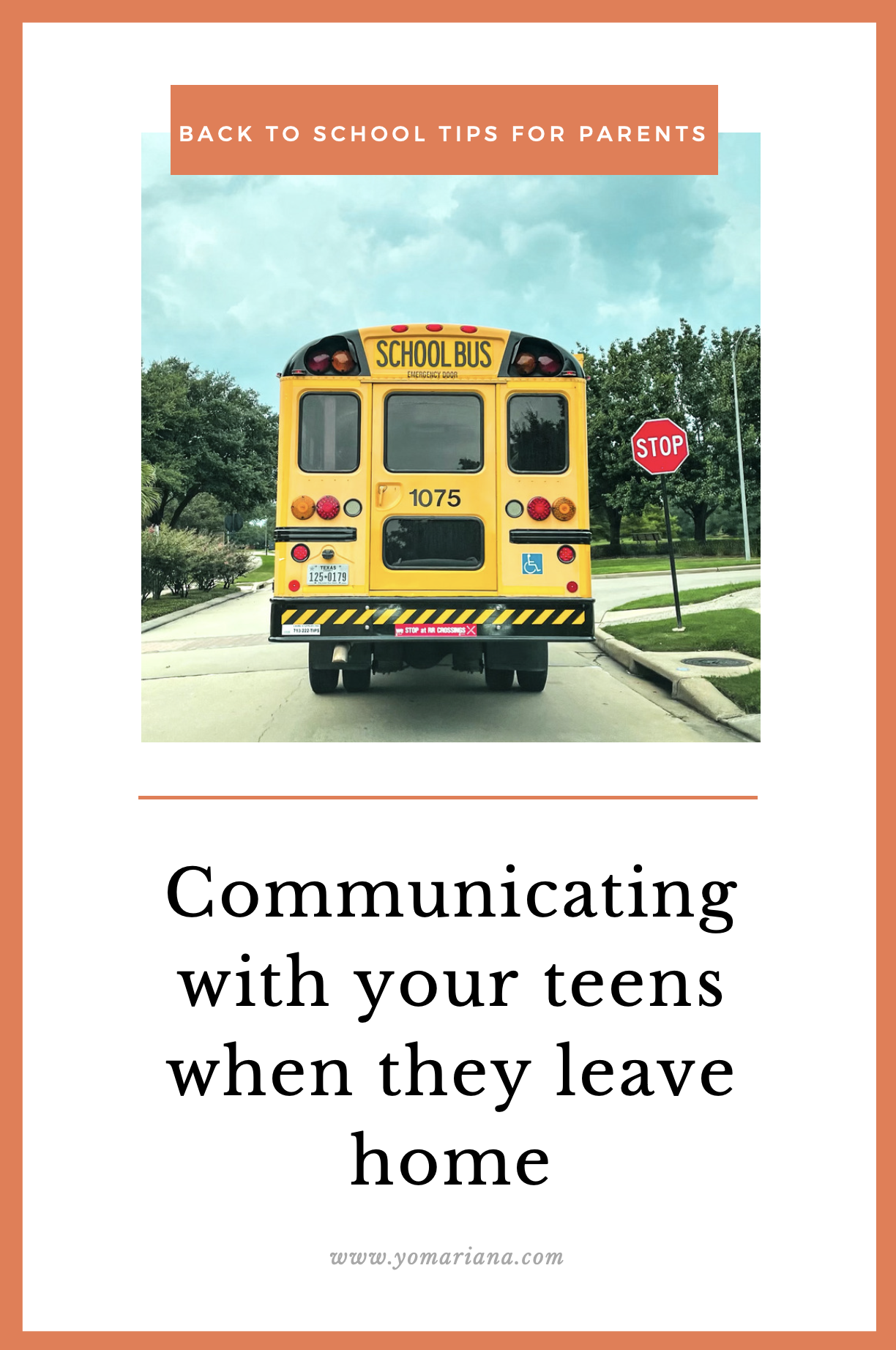Communicating with your teens when they leave home
/This back-to-school feels different. To see my kids as the main characters of their own story reminds me of how independent they’ve become. I can feel their excitement and curiosity wrapped up around pure innocence every time they experience something new, which fills my heart with tenderness and panic all at once.
It’s funny how the back-to-school photos on my Instagram feed are very different this time around. Instead of showing photos of cute little kids in uniforms and big backpacks, now it’s filled with photos of smiling teenagers enjoying their new dorms and heartfelt farewell hugs as parents say goodbye to their children. I’ve witnessed how a lot of friends have gone through that painful process of dropping off their kids at college and it doesn’t look like fun.
I'm still a couple of years away from that moment, but I can feel it getting closer. It’s exciting to visualize my kids being eager and ready to move on to college, but at the same time I simply can't imagine how heartbreaking that moment is going to be.
The school year has just started, and it has already suffered drastic changes in the way I communicate with my kids about school-related issues. I’ve learned that now my kids are responsible for figuring out their school schedules, clarifying situations with their teachers, establishing relationships with school principals, and even finding emotional support with their school counselors.
It's been so tricky to find that balance between being an involved and interested parent without overstepping while having the courage to slowly let go of that helicopter mom syndrome I've always had.
A week ago, I had the opportunity to attend a Zoom session organized by Responsibility.org to learn more about how to help our teenage kids cope with this back-to-school season, and it was super helpful. A panel of education experts walked us through several tips and suggestions that I'm excited to share with all of you today.
The panelists began the session by saying that teachers, principals, and counselors, need a lot of parent support regardless of the grade level your kids are at. That made me realize that even if my kids are more independent now, communication about school-related issues with them and school staff is still important, it just needs to be reshaped.
In this session, they shared with us great tips on how to achieve this new model of communication with our kids and school staff that I'm sure will help you as much as they’ve helped me:
1.- Parents will always be the main role models to their kids so it's important to show them the benefits of maintaining good relationships with school personnel.
2.- Ask your kids about how they interact with the institution and what kind of relationships they currently have with the staff.
3.- Make sure your kids are aware of all the different ways they can communicate with school staff. For example, make sure they know how to access the digital calendar and newsletters, if they know the emails of key people who will be able to support them with academic questions and emotional issues, who is the person assigned as their counselor, and how to communicate with them, etc. Let's not assume they know, many times they don't.
Now, if your kids are in college, you need to understand that communication is still more important than ever. You'll need to find new ways to communicate with your kid since now you won't have the school commute or dinner table time to chat with them about their issues as you used to.
The panelists' recommendations are:
1.- Remodel the communication with your kids by asking them their preferences, such as what time works best for them, do they prefer daily messages, or a long call on Sundays.
2.- Continue to prioritize those meaningful and valuable conversations with your children, even if now they must be over the phone.
3.- Words matter. Try to ask them more open-ended questions to avoid a "yes" or "no" answer.
4.- As parents, we must understand that having these long-distance conversations will be difficult because when our kids get their free time they probably are going to prefer to relax, put their AirPods on and disconnect from the world for a while.
5.- If you feel it was not a good time to start a long and meaningful conversation, say to them: "I understand that you don't feel like having this conversation right now, let's talk when you are ready, just remember that I am here to support you and to have these conversations with you whenever you want." We can understand this situation perfectly well since many times as parents we don’t feel like talking about our concerns.
6.- Contact your kids regularly and don't be afraid to show them your vulnerability. That will give them the confidence to share with you their vulnerable moments and will open a little bit more the communication channel.
7.- In this link, you will find several ideas about how to start conversations with your teenagers about COVID, social justice, how to avoid the consumption of alcohol and other substances, among other topics.
The panelists also shared with us several tips on how to interact with universities and find support from institutions, without getting in the way or stepping over our children:
1.- Know who the key players are involved in your kid's education.
2.- Don't feel intimidated by the seriousness or size of the institution, approach them with all your questions and concerns.
3.- Identify who's your best contact to reach depending on the topic you want to address. Maybe some things are dealt with by the academic dean and others with the school counselor.
4.- Know that teachers and school staff are eager for parents' and students' feedback.
5.- Don't let your high school or college personal experiences get in the way of wanting to find out more about how your kid is doing and make the effort to start those conversations with them.
6.- Enable advocacy, but also create a safety net for your kids when they are struggling to speak or stand up for themselves.
7.- Most of the panelists were teachers and school staff and they repeated constantly that it's never overwhelming for teachers when parents want to touch base and talk about their kids.
I can still remember all the books I bought about maternity and children's physical and intellectual development when my kids were little. I was so aware of every milestone and how my life was going to change after they reached every one of them.
My kid is potty trained, now my life will change forever.
My kid sleeps through the night, now my life will change forever.
My kid finally let go of the pacifier, now my life will change forever.
My kid is going to school every day, now my life will change forever.
My kid is driving to school by herself, now my life will change forever.
But I don't think no book can prepare you for:
My kid doesn't live with me anymore, now my life will change forever.
Thanks to Responsibility.org for continuing to encourage parents to have those important conversations with our kids, no matter their age, and to provide us with all the tools we need to achieve it.
Let’s never miss the opportunity to have those conversations with our children, it’s the greatest power we have to keep our love and communication bond with them alive forever.











































